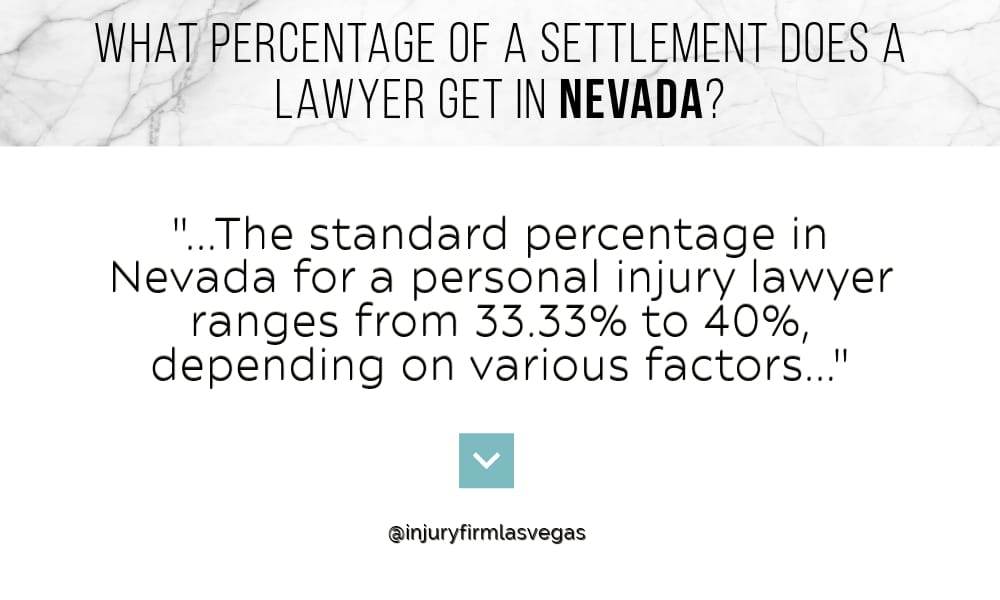Attorney’s fees in a personal injury claim are typically paid on a contingency fee basis. In other words, if the plaintiff wins, their attorney will take a percentage of the settlement. If the plaintiff loses, the attorney gets nothing. If you have an injury claim in Nevada, you may be wondering, what percentage do personal injury lawyers get? If so, we’ve written this for you.

Most personal injury lawyers will take anywhere from 33.3% and 40% of the final settlement award. However, this number may fluctuate depending on the circumstances of your case. For example, if your case goes to trial, your attorney may require the 40% contingency fee to compensate for trial preparation.
Knowing what to expect in terms of a contingency-fee arrangement is a crucial element in navigating the injury lawyer hiring process.
So, let’s dive in deeper and discover the driving elements behind how much of a settlement a lawyer takes.
On This Page

In this article, our Las Vegas car accident lawyer discusses how attorney’s fees work in Nevada accident cases:
Contingency Fee Agreements in Nevada Personal Injury Cases
Almost every lawyer is paid on a contingency fee basis. This typically means that, unless your attorney recovers financial compensation for you, you are not required to pay them. Conversely, if they do win a settlement, you will pay them a percentage of the settlement that is awarded.
The typical contingency fee in Nevada personal injury cases ranges between 33.33% to 40% of the plaintiff’s settlement plus case costs. That means that if you are awarded $100,000 in damages, the attorney would get between $33,330 and $40,000 (33.33%-40% of $100,000).
Although it is not required that lawyers work for their clients on a contingency fee basis, it has become the industry standard as it is typically in the client’s best interest. Here is why:
Contingency fee agreements allow those who have become injured and would otherwise not be able to afford an attorney, to hire an attorney, risk-free: If the attorney loses the case, the victim pays no money (in most cases).
How a contingency-fee agreement benefits the plaintiff
Although it is not required that personal injury lawyers work on contingency, it is a common practice for this area of practice as it will usually provide the most mutually-beneficial outcome for both the attorney and client.
Contingency fee agreements afford injury victims who would otherwise not be able to afford legal representation the peace of mind knowing there is no up-front cost for hiring a lawyer. Further, if the attorney loses the case, they are not liable for any attorney’s fees.
Conversely, this type of arrangement entices lawyers to work vigorously to ensure they collect maximum compensation. Their bottom-line depends on it!
What is the average percentage for attorney fees in Las Vegas?
The average percentage for attorney’s contingency fees for personal injury cases in the state of Nevada ranges between 33.3% to 40% of the plaintiff’s settlement, in addition to being responsible for relocated case costs.
Nevada law requires that all contingency agreements be made in writing. A verbal agreement will not suffice.
In addition, contingency agreements should, at a minimum, include the following provisions:
- How the fee is calculated, including the percentages owed to the attorney in the event of settlement, trial, or appeal; and
- If litigation fees are deducted from the settlement amount; and
- whether the client is liable for the expenses regardless of the case outcome.
Once the case is either settled or dismissed, the attorney must provide the client with an outline of the case as well as a settlement statement along with an outline of fees due to the attorney. This fee will typically include a contingency fee alongside any costs incurred.
Additional fees that can be calculated into your settlement award
Court costs encompass all of the expenses the attorney incurred in preparing the case. Typical examples include:
- Court reporters’ fees for depositions, including a reporter’s fee for a certified copy of each deposition; jurors’ fees, witness fees, pretrial hearing fees, and expenses (assuming the case escalates to trial);
- Interpreters’ fees (for deposition or trial);
- Process server fees;
- Reasonable costs for printed copies, digital copies, postage, and travel and lodging in relation to deposition costs;
- Court fees for filings;
- Any other reasonable and required expense incurred in relation to the lawsuit.
In most contingency fee arrangements, the attorney will agree to absorb all costs related to the case in the event they do not win. This provides injury victims even more incentive to retain an attorney.
However, if the attorney wins the case, most contingency fee agreements have a provision that requires reimbursement for the attorney’s out-of-pocket expenses out of the plaintiff’s settlement.
Calculating your final settlement amount
One of the most common questions we hear is, “will medical bills come out of my settlement?”
Typically that answer varies on a case by case basis, and this is obviously something you’ll want to discuss with your chosen personal injury lawyer prior to employing their services.
Example: Let’s say your attorney charges you 33.3%. If they recover a $100,000 settlement on your behalf, and your medical bills were reduced to $20,000, they may receive $33,330 (33.3%) while you would walk away with $46,670.
What percentage do lawyers get in other areas?
As with many things around the country, attorney fees percentages can differ greatly from one state to the next. Nationwide, the average percentage lawyers take from a settlement can range from 25% to 40%.
Depending on a number of factors, these percentages change when comparing a car accident settlement, to a disability claim, or a medical malpractice case for example.
Common factors that may influence the fee your attorney charges may include:
- The level experience your attorney has
- The laws of the state you live in.
- Whether or not your case goes to trial
How much do personal injury lawyers make per case in Las Vegas?
33.3% – 40% range is typical for personal injury lawyers in Nevada.
The following items may be listed on the final closing statement as additional costs associated with a claim:
- Police reports
- Court filing fees
- Legal filing & deposition fees
- Mail & postage fees
- Private Investigator fees
- Fees for expert witnesses
- Fees for medical records
- Trial exhibits
Do I Pay for Legal Expenses Accrued Throughout My Case?
Typically, all costs accrued throughout your injury claim will be paid upfront by your attorney. Once your case is closed, the expenses accrued throughout your case will be listed on the final closing statement. These expenses will be deducted from your final settlement amount and paid back to the law firm.
This no-upfront fee model allows equal opportunity to all injury victims to receive the service and treatment needed to pursue a claim.
In the event that you do not win your claim, you may be held liable for some expenses accrued, so it is important to discuss any concerns you have regarding out-of-pocket expenses with your attorney prior to signing a retainer agreement.
Are Attorneys Fees Negotiable
As long as you have not signed a retainer agreement with your lawyer, you may be able to negotiate a lower contingency fee. Although this is not common practice, here are a few scenarios in which your attorney may agree to a reduced fee:
- You are a previous client;
- They are a brand new attorney or law firm;
- Your case is likely to settle right away;
- You are a veteran, first responder, or teacher (some attorneys offer discounts for these professionals)
In most cases, however, attorneys will not accept a case for less than the standard 33.3%. Keep in mind that by selecting the best lawyer, you’re likely better off financially than finding a lawyer to represent you for a reduced fee. An experienced lawyer will have a proven track record of being awarded large settlements for their clients.
Can I Save Money By Filing My Own Personal Injury Claim?
You may think you can handle your injury claim alone—especially if it seems like an easy case. But the fact of the matter is this: people who hire an injury lawyer almost always walk away with more substantial settlement amounts.
Why hiring a lawyer can boost your settlement award:
- They know how to push back against insurance companies
- They know how to find every dollar you’re entitled to recover
- They can prevent you from making mistakes that could cost you money
- They can fight back in the event the insurance company tries to apportion fault
- Insurance companies are more likely to cooperate when they know a lawyer is involved
When all is said and done, even after paying a lawyer’s fee (usually 33.3%–40%), most clients still end up with more money in their pocket than if they went at it alone.
Questions to Ask an Injury Lawyer Before Hiring Them
By hiring an experienced personal injury lawyer, you are setting yourself up for a more successful injury claim in terms of reaching the highest possible settlement offer. That said, the thought of hiring an attorney may sound a bit intimidating. If you are in the process of shopping law firms, here are a few things to ask for:
- What are your contingency fees?
- Are there any additional fees that I will be charged?
- How many cases like mine have you successfully settled?
- Is there any chance my case will not settle? If so, why?
- Will I work directly with you or will my main contact be a case manager?
- Do you have any references that I may call?
Signing the Closing Statement
The closing statement is the final breakdown of who gets what and where the funds are allocated for the case. This very important document will outline your final settlement award and any out-of-pocket expenses paid by the law firm, like court filing fees, the cost of records requests and police reports. It will also show medical bills paid out of your settlement and the final amount paid to your attorney.
This document ensures transparency of all money spent out of your settlement award.
FAQs
- What is the average amount that most lawyers take from a settlement?
- Do attorneys usually get more money than clients from settlements?
- Do I still pay if I lose my case?
- What is the most a lawyer can take from a settlement?
- Is there an attorney fee cap on my case?
What is the average amount that most lawyers take from a settlement?
Most injury lawyers will charge between 33.3%-40%of the final settlement amount. However, this fee can increase to 40% in the event the case enters litigation.
Do Nevada lawyers take most of the settlement?
It depends on the lawyer. In some cases, when a lawyer’s fee becomes higher than the client’s payout due to high medical bills or a low settlement offer, it is not uncommon to see the attorney reduce their fee so their client walks with more money in their pocket. However, this is up to the discretion of the attorney and/or law firm.
What’s the most a lawyer can take from a settlement?
A lawyer will usually take anywhere from 33.3% to 40% of a personal injury settlement: 33.3% for pre-litigation settlements and 40% for any case settled in litigation and beyond. The final amount a lawyer will take is heavily influenced by state-specific laws and regulations, such as fee-caps, the complexity of the specific case, any additional external fees accrued.
Is there an attorney fee-cap on my case?
Whether or not there will be a fee cap on your personal injury claim depends on the state you were injured in. In the State of Nevada, there is currently no fee cap on personal injury claims.
In 2022, an Uber-backed bill proposed a 20% fee cap on all civil cases; however, the court ruled the ballot initiative legally deficient and did not make its way to the legislature.
Below we have comprised a quick outline of all current attorneys fee caps in the United States as of 2025:
| State | Type of Cap | Percentage |
|---|---|---|
| Michigan | All Civil Cases | 33% |
| Oklahoma | All Civil Cases | 50% |
| California | Medical Malpractice (sliding scale) | 40% / 33.3% / 25% / 15% |
| New York | Medical malpractice (sliding scale) | 30% / 25% / 20% / 15% / 10% |
| Connecticut | Medical Malpractice (sliding scale) | 33.3% / 25% / 20% / 15% / 10% |
| Delaware | Medical Malpractice (sliding scale) | 35% / 25% / 10% |
| Florida | Medical Malpractice (stage-dependent) | Higher Cap at Trial |
| Illinois | Medical Malpractice | 33% |
| Indiana | Medical Malpractice | 15% vs 32% (based on award timing) |
| Maine | Medical Malpractice (sliding scale) | 33.3% / 25% / 20% |
| Massachusetts | Medical Malpractice (sliding scale) | 40% / 33.3% / 30% / 25% |
| New Jersey | Medical Malpractice (sliding scale) | 33.3% / 30% / 25% / 20% |
| Tennessee | Medical Malpractice | 33.3% |
| Utah | Medical Malpractice | 33.3% |
| Wisconsin | Medical Malpractice (sliding scale) | 33.3% / 25% / 20% |
In summary, if you’re still asking yourself, “what percentage do most lawyers take from a settlement?” remember the following:
- Most lawyers will charge between 33.3%-40%
- Medical bills and other external costs will be factored into your final settlement amount
- A lawyer may have the ability to reduce certain medical bills on your behalf – which can leave more money in your pocket.
- By hiring an experienced lawyer, you are setting yourself up for obtaining maximum compensation for your injury claim.
If you or a loved one have experienced injury due to negligence, please do not hesitate to contact our award-winning Personal Injury Lawyer, Brian Boyer Injury Lawyer for a free, no-obligation case review. He will help you achieve financial recovery and answer any questions you may have along the way.
Related Content

CONTACT OUR LAW FIRM
FREE CONSULTATION
